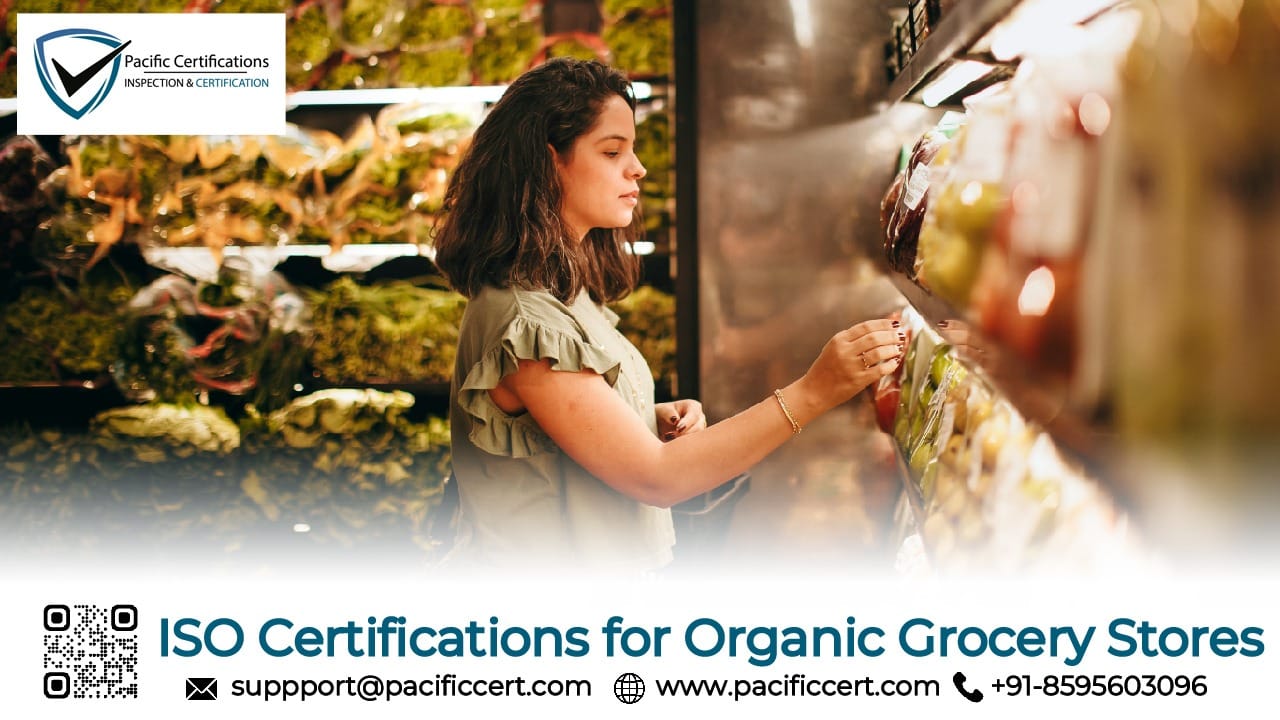ISO Certifications for Organic Grocery Stores, Requirements and Benefits

Quick Summary
"Organic grocery stores are increasingly adopting ISO standards to meet rising expectations around quality, safety, and sustainability. Key certifications include ISO 22000 (Food Safety Management) for safe perishable handling, ISO 9001 for consistent quality, ISO 14001 for reducing environmental impact, ISO 45001 for workplace safety, ISO 10002 for customer complaints, ISO 50001 for energy efficiency, and ISO 26000 for ethical and social responsibility. Certification involves implementing documented processes, conducting internal audits, and undergoing third-party assessments. Benefits include enhanced consumer trust, smoother market access, improved efficiency, regulatory compliance, safer workplaces, and stronger environmental performance—helping these stores stand out in a competitive, eco-conscious market."
ISO Standards for Organic Grocery Businesses
In today’s conscious consumer era, ISO Certifications for Organic Grocery Stores have become a vital benchmark for quality and sustainable growth. As global demand for organic products continues to rise, so do the expectations for safety, transparency and regulatory compliance. ISO standards play a pivotal role in shaping the excellence of businesses that cater to eco-conscious buyers.
Organic grocery stores are the gatekeepers of public health, environmental sustainability and food security. Ensuring that these stores operate in a standardized and safe manner is paramount. That’s where ISO standards come in. The International Organization for Standardization develops international standards that ensure products and services are safe, reliable, and of good quality. For organic grocery stores, adopting these standards can help build credibility, assure customers of quality, and enable smooth market entry across borders.
Reach out to us at [email protected] or call +91-8595603096. Visit www.pacificcert.com for details!
Applicable ISO Standards for Organic Grocery Stores
Organic grocery stores may align with several ISO standards based on the nature of their operations:
- ISO 22000 – Food Safety Management Systems (FSMS)
Ensures that food is safe at every step of the supply chain. Essential for stores selling perishable organic products. - ISO 9001 – Quality Management Systems (QMS)
Enhances customer satisfaction through consistent quality products and continuous improvement. - ISO 14001 – Environmental Management Systems (EMS)
Ideal for stores aiming to reduce their environmental footprint and demonstrate ecological responsibility. - ISO 45001 – Occupational Health and Safety Management Systems
Protects workers and customers by identifying and mitigating health risks. - ISO 26000 – Guidance on Social Responsibility
Though not certifiable, this helps organizations implement social responsibility practices, including ethical sourcing and fair trade. - ISO 10002 – Customer Satisfaction and Complaints Handling
Supports organic stores in systematically managing customer feedback and complaints. - ISO 50001 – Energy Management Systems
Facilitates better energy usage, particularly in temperature-controlled organic product storage.
Click here to find out more applicable standards to your industry
At Pacific Certifications, we specialize in auditing and issuing certifications against various ISO standards. For organic grocery stores looking to gain credibility and meet global benchmarks, we conduct independent audits and ensure your compliance with the relevant ISO standards. We do not offer consulting, training, or implementation services—our focus is on objective certification and audit-based validation.
We are accredited and recognized for our integrity, impartiality, and technical competence in ISO auditing. We guide you through the audit process with minimal disruption to your operations while maximizing your quality assurance outcomes.
Get in touch with Pacific Certifications via [email protected] or +91-8595603096. Learn more at www.pacificcert.com
Requirements of ISO Certifications for Organic Grocery Stores
Below the requirements for each ISO standard relevant to Organic Grocery Stores:
ISO 22000 – Food Safety Management Systems
- Identify and assess food safety hazards across supply chains
- Implement prerequisite programs (PRPs) for hygiene and sanitation
- Establish a HACCP (Hazard Analysis and Critical Control Points) plan
- Maintain traceability and recall procedures
- Conduct internal audits and management reviews
- Ensure continual improvement in food safety performance
ISO 9001 – Quality Management Systems
- Define and document quality objectives and policies
- Maintain consistent product and service quality
- Monitor customer satisfaction and handle complaints
- Ensure competent and trained staff
- Regular internal audits and process evaluations
- Emphasize continual improvement and risk-based thinking
ISO 14001 – Environmental Management Systems
- Identify environmental aspects and legal compliance obligations
- Set objectives to reduce environmental impact (e.g., waste, emissions)
- Monitor energy, water, and resource usage
- Implement emergency preparedness and response plans
- Evaluate supplier environmental performance
- Conduct periodic environmental audits
ISO 45001 – Occupational Health & Safety Management Systems
- Identify workplace hazards and implement control measures
- Provide safe working conditions and protective equipment
- Define roles and responsibilities for OH&S
- Engage employees in safety practices and decisions
- Conduct incident reporting and root cause analysis
- Improve health and safety performance continuously
ISO 26000 – Social Responsibility (Guidance Only)
- Respect human rights and labor practices
- Promote fair trade and ethical sourcing
- Encourage community involvement and development
- Support consumer rights and product transparency
- Address environmental and societal impacts responsibly
- Practice fair competition and anti-corruption
ISO 10002 – Customer Satisfaction & Complaints Handling
- Establish a clear complaints handling policy
- Create transparent complaint submission channels
- Respond to and resolve customer complaints promptly
- Record and analyze complaint data
- Train staff to handle feedback professionally
- Improve products/services based on customer input
ISO 50001 – Energy Management Systems
- Identify major energy-consuming processes
- Set measurable energy efficiency objectives
- Monitor, analyze, and improve energy performance
- Implement energy-saving technologies and practices
- Comply with applicable energy regulations
- Foster staff awareness and training on energy efficiency
Contact Pacific Certifications for reliable ISO certification services: [email protected] | +91-8595603096 |
Benefits of ISO Certifications for Organic Grocery Stores
Implementing ISO certifications brings a host of advantages that go beyond mere compliance:
- Consumer Trust
Certified stores are perceived as more reliable, safe, and ethical. - Market Access
Certification facilitates expansion into new markets and differentiates the store in a crowded market. - Efficiency
ISO 9001 and ISO 50001 reduce waste and optimize processes, increasing overall profitability. - Compliance
ISO standards help navigate complex food safety and environmental regulations with confidence. - Employee Safety
ISO 45001 enhances workplace safety, leading to better employee retention and reduced incident rates. - Sustainable Practices
ISO 14001 encourages eco-friendly practices such as waste reduction, energy conservation, and sustainable sourcing.
According to recent market research, the global organic food and beverages market is expected to reach USD 750 billion by 2030, growing at a CAGR of 14.5%. Consumer focus on transparency, traceability, and safety has never been higher.
ISO certifications are fast becoming prerequisites for participation in high-end retail, e-commerce platforms, and export markets. Governments and trade bodies are now pushing for mandatory compliance with ISO 22000 and ISO 9001 for food retailers, particularly those selling certified organic products.
Organic grocery stores, particularly in Europe and North America, are actively pursuing ISO 14001 to align with the Sustainable Development Goals (SDGs). In Asia, small-scale stores are seeing improved customer footfall post-ISO certification, according to a 2025 report by Global Food Insights.
Pacific Certifications is here to help you meet international standards through independent, reliable audits and ISO certifications. Make your store a symbol of safety, sustainability, and excellence!
Pacific Certifications is accredited by ABIS, in case you need support with ISO certification for your Organic Grocery Stores business, please contact us at [email protected] or +91-8595603096
Ready to get ISO certified?
Contact Pacific Certifications to begin your certification journey today!
Suggested Certifications –
Read more: Pacific Blogs

